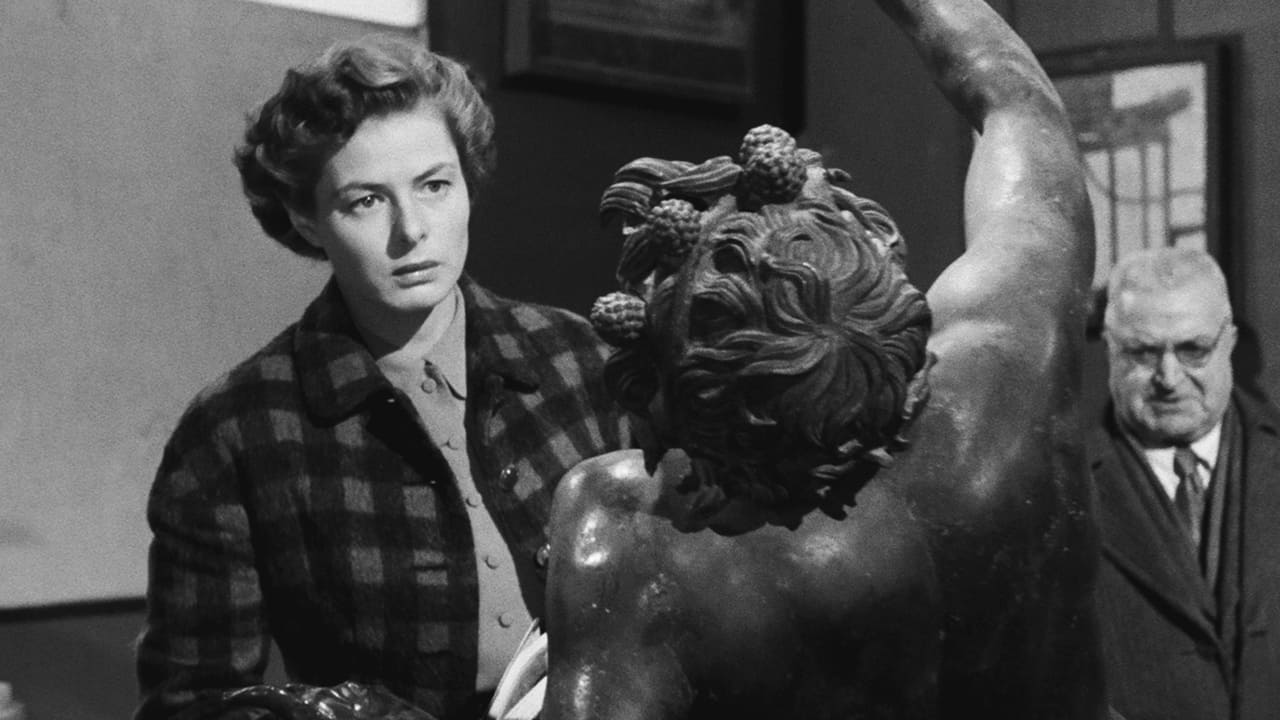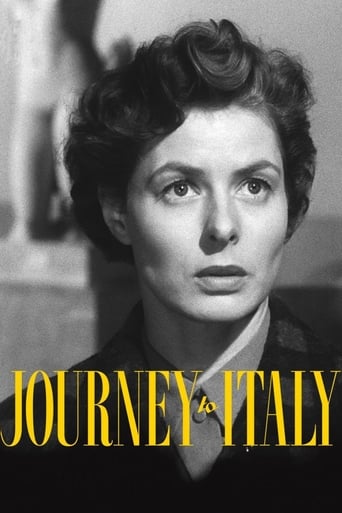

Look, it's Rossellini in the Fifties, B&W, with Bergman, shot at all these great sites in Italy. So sure, on some level I'm going to enjoy it. But that doesn't mean I have to buy into its reputation as a great movie. The story centers on the relationship of an "English" couple. They've been married for eight years. They're unhappy. Their marriage is on its last legs. At the end of the movie, they get back together. So the movie has to be how whatever we see happen in it culminates in their reconciliation. And it utterly fails to do that. First, WHY are these two together at all? She's obviously not English. How did they get together? But more important, the husband, played by George Sanders, is SO unappealing, so cold, so wretched, that's it's impossible to see what attracted a romantic like the Bergman character to him. I get it that he's English, upper (or upper-middle) class, emotionally stunted from going to English public schools, etc. You don't expect him to insist on couples' counseling. (I love the Sanders line, when he wants to describe the essence of a couple he met, and settles on simply "talkative.") But Rossellini has got to give us SOMETHING to go on, something to show us that he has some humanity, or had at one point. Or show us in the film how he has changed, and why, because of his time in Italy. This is a guy who goes into a rage because his wife takes the car without asking him. But there's so little sign that he can be more than what we see. He has a short dalliance with a woman who tells him that she is going back to her old lover. And you get the feeling if she hadn't said no, he would still be with her. As for Bergman, her character is more sympathetic and interesting. But she looks frumpy -- why hire Bergman and then make her frumpy? -- she's self-pitying, and weak. She stirs some sympathy, but not much. At the end, in a last-second, not-believable change of heart, the husband says to his wife: "If I tell you I love you, do you promise not to use it against me?" Just what every woman longs to hear.
... View MoreLuckily they projected an old 35 mm copy to get the right feeling of looking at the past. This is not a very spectacular movie. It seems that the tourism promotion of Naples in 1954 sponsored part of the movie. There is a lot of advertising time for the area around Naples (Pompeij, Capri) in it. But from today's point of view these scenes are quite interesting. You see explanations how they uncovered the remains of Pompeij and wonderful statues of ancient times. Besides that we see a very believable struggle between man and woman in a late stage of their marriage. How first love is translated into a somehow different, but never-the-less, important feeling.
... View MoreThis movie was playing during an Ingrid Bergman 100th birthday series. Since I had never seen any of her films with her then-husband, Roberto Rossellini, and since I also really like George Sanders, I decided to see "Journey to Italy."My first thought, uncharitable as it may be, was that Bergman made a mistake when she became involved with Rossellini, and went into exile from Hollywood. "Journey to Italy" certainly wasn't lacking in realism, either in the conflicts between the couple whose story was featured, or in the footage of Pompei and Naples, but it felt unfinished and rough, lacking the polish of the, I believe, far superior films Bergman made in Hollywood, such as "Notorious," "Gaslight," "Casblanca," and the others.There's a lot to be said for movies that have polish. I essentially adopt the Hitchcock view of film-making. He once said, "Some directors make films that are slices of life. Mine are slices of cake." I believe art, and that includes cinema, shouldn't merely reflect reality, it should reflect on and heighten reality, otherwise it might as well be journalism or a documentary. While the conflict between the couple felt real and plausible, and their shared experience in the ruins of Pompei was insightful, I did not feel much moved as I watched those scenes. The insight gained was essentially abstract and intellectual. However, I did think that the film resembled a couple of other noted "marriage" movies - "Two for the Road," and "The Awful Truth." I have to say I think both are superior to "Journey to Italy," in spite of the intriguing cast and premise.
... View More(Spoilers) This is the story of an upper class English couple (Alexander and Katherine) traveling to Italy to settle up the sale of a villa that Alex had inherited from an uncle. From the fist scenes on we see the friction in the marriage--the fact that they take separate bedrooms is not a good sign. When either of the two hints that there may be some spark left to their marriage, the other quashes it with a contrary act or comment. When Alex suggests that they have never really known each other and perhaps they can start over, Katherine says, "Let's go down to the bar." During an argument, Alex haughtily tells Katherine that, "Of course there are a few things I don't like about you. Your lack of a sense of humor, your ridiculous romanticism." Each plays to the jealousy of the other throughout the movie.I did not feel that the actors were challenged to play beyond their comfort zone. Sanders can play a somewhat cynical, upper class Englishman without breaking a sweat and Bergman, while good, turns in a performance that is not particularly noteworthy, although just having her on screen is a plus. The dialog is quite stilted--in fact I thought the film had been dubbed into English until I did some lip reading to determine otherwise.The movie offers a bit of a travelogue for Naples and the surrounding area. Those scenes are captured during Katherine's solo sightseeing trips after Alex had gotten disgusted and headed off to Capri to stay with some friends. The urban scenes that Katherine sees as she drives to various attractions are the most artificially inserted I have seen. It is clear that Katherine is being filmed in a studio, and then some stock footage is being shown of street scenes. The filming at tourist highlights were the most enjoyable parts of the movie for me. Those scenes would have been much better in color--I am sure that the Naples harbor looking toward Capri must be spectacular, but it's rather unimpressive as seen here.The ending is about as preposterous as I have seen. After all of the antagonism between Alex and Katherine, less that a minute after Katherine emphatically says to Alex, "I despise you," the two are embracing and saying, "I love you."This movie has been praised as a masterpiece and as the first modern movie. Those who think it is a masterpiece were certainly plugged in to this at a higher level than I. And is "Citizen Kane" not a modern movie? Or De Sicas's "Shoeshine" or "Bicycle Thief" for that matter?
... View More